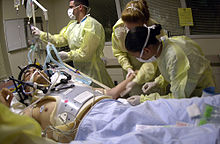
Back رضة خطيرة Arabic Úraz Czech Μείζον τραύμα Greek ترومای حاد Persian Traumatisme majeur French Խոշոր վնասվածք Armenian Trauma besar ID Vunduro IO Fizikal chraama JAM 손상 Korean
| Major trauma | |
|---|---|
 | |
| Health care providers attending to a person on a stretcher with a gunshot wound to the head; the patient is intubated, and a mechanical ventilator is visible in the background | |
| Specialty | Emergency medicine, trauma surgery |
Major trauma is any injury that has the potential to cause prolonged disability or death.[1] There are many causes of major trauma, blunt and penetrating, including falls, motor vehicle collisions, stabbing wounds, and gunshot wounds. Depending on the severity of injury, quickness of management, and transportation to an appropriate medical facility (called a trauma center) may be necessary to prevent loss of life or limb. The initial assessment is critical, and involves a physical evaluation and also may include the use of imaging tools to determine the types of injuries accurately and to formulate a course of treatment.[citation needed]
In 2002, unintentional and intentional injuries were the fifth and seventh leading causes of deaths worldwide, accounting for 6.23% and 2.84% of all deaths. For research purposes the definition often is based on an Injury Severity Score (ISS) of greater than 15.[2]
- ^ "Glossary". National Highway Traffic Safety Administration. Retrieved 26 March 2014.
- ^ Palmer, C (2007). "Major trauma and the injury severity score—where should we set the bar?". Annual Proceedings of the Association for the Advancement of Automotive Medicine. 51: 13–29. PMC 3217501. PMID 18184482.
© MMXXIII Rich X Search. We shall prevail. All rights reserved. Rich X Search